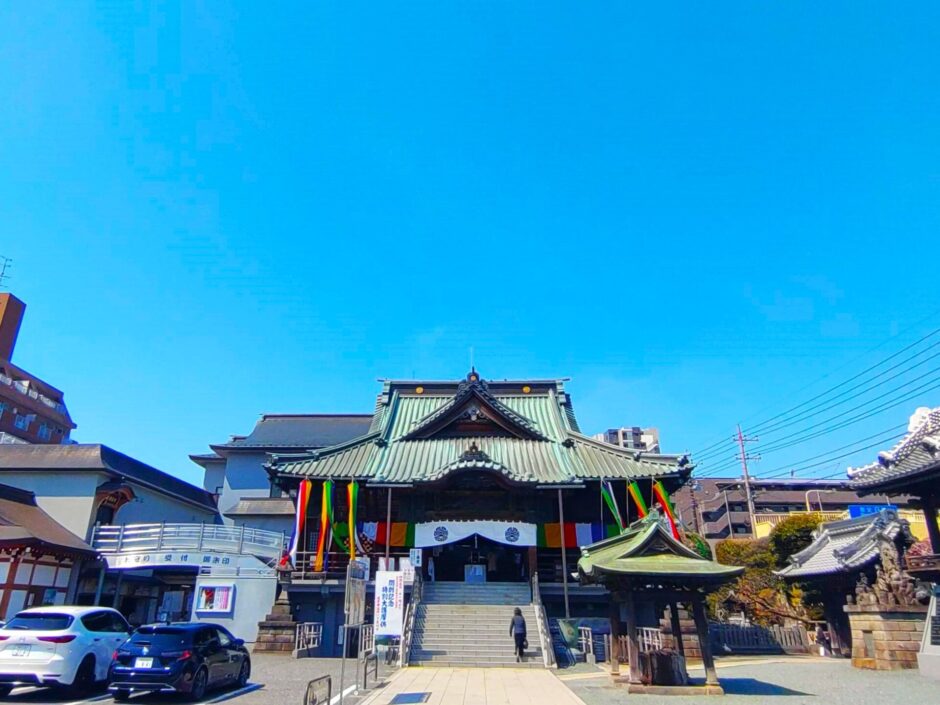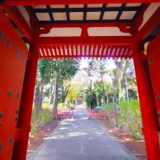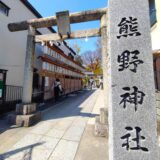目次
- 【Narita-san Kawagoe Betsuin summary】
- 【Narita-san Kawagoe Betsuin precincts】
- 【Narita-san Kawagoe Betsuin main temple building】
- 【Narita-san Kawagoe Betsuin hall with an enshrined statue of Kobo Daishi (at a Shingon temple)】
- 【Narita-san Kawagoe Betsuin Turtle Pond】
- 【Narita-san Kawagoe Betsuin Nearby attractions】
- 【Narita-san Kawagoe Betsuin Access】
- Manager’s comment.
- Narita-san Kawagoe Betsuin
【Narita-san Kawagoe Betsuin summary】
Naritasan Kawagoe Betsuin (Naritasan Kawagoe Betsuin Hon Gyoin) was built in 1853 (Kaei 6). Teruon Ishikawa, a Chiba resident who was cured of an eye disease by praying to Fudo Myoo, restored the Kubo-cho Hongyoin Temple, which had been closed, and enshrined the spirit of Fudo Myoo, which was given by Naritasan, and built it as the Naritasan Kawagoe Betsuin. In other words, it is a branch temple of Naritasan Shinshoji Temple and a Shingon esoteric Buddhism temple. Today, the temple is commonly known as Kawagoe Fudo, and a flea market (antique market) is held on the 28th of every month, which is very popular.
![Narita-san Kawagoe Betsuin [Saitama] 26603463 m 160x160 - Narita-san Kawagoe Betsuin [Saitama]](https://japan-shrine.info/wp-content/uploads/26603463_m-160x160.jpg) Fukagawa Fudo Hall (Narita-san Tokyo Betsuin) [Tokyo]
Fukagawa Fudo Hall (Narita-san Tokyo Betsuin) [Tokyo]
Naritasan Shinsho-ji Temple has 71 branch temples, annexes, branch branch branch temples, branch temples, branch churches, and Naritasan Church throughout Japan, where priests dispatched from Naritasan are in charge of legal affairs.
![Narita-san Kawagoe Betsuin [Saitama] DSC 2463 1024x767 - Narita-san Kawagoe Betsuin [Saitama]](https://japan-shrine.info/wp-content/uploads/DSC_2463-1024x767.jpg)
The main deity is Fudo Myoo.
【Narita-san Kawagoe Betsuin precincts】
![Narita-san Kawagoe Betsuin [Saitama] DSC 2461 1024x768 - Narita-san Kawagoe Betsuin [Saitama]](https://japan-shrine.info/wp-content/uploads/DSC_2461-1024x768.jpg)
The hanatemizu is a modest but beautiful decoration.
【Narita-san Kawagoe Betsuin main temple building】
![Narita-san Kawagoe Betsuin [Saitama] DSC 2462 1 1024x768 - Narita-san Kawagoe Betsuin [Saitama]](https://japan-shrine.info/wp-content/uploads/DSC_2462-1-1024x768.jpg)
The present main hall was rebuilt in 1933.
【Narita-san Kawagoe Betsuin hall with an enshrined statue of Kobo Daishi (at a Shingon temple)】
![Narita-san Kawagoe Betsuin [Saitama] DSC 2505 1024x768 - Narita-san Kawagoe Betsuin [Saitama]](https://japan-shrine.info/wp-content/uploads/DSC_2505-1024x768.jpg)
There was a large vajra object.
The vajra is a Buddhist implement symbolizing the esoteric Buddhist teachings that Kukai learned in the Tang Dynasty at that time. It is believed to be effective in smashing demons and calamities, defeating afflictions, driving away evil spirits, and bringing good luck.
![Narita-san Kawagoe Betsuin [Saitama] DSC 2506 1024x768 - Narita-san Kawagoe Betsuin [Saitama]](https://japan-shrine.info/wp-content/uploads/DSC_2506-1024x768.jpg)
There was a statue of Kobo Daishi (Kukai) next to the Daishi Hall.
【Narita-san Kawagoe Betsuin Turtle Pond】
![Narita-san Kawagoe Betsuin [Saitama] DSC 2467 1024x768 - Narita-san Kawagoe Betsuin [Saitama]](https://japan-shrine.info/wp-content/uploads/DSC_2467-1024x768.jpg)
It was a bit cold that day, so the turtles were sunning themselves in a sunny spot.
【Narita-san Kawagoe Betsuin Nearby attractions】
Kita-in Temple, Senba Toshogu Shrine, Kawagoe Kumano Shrine
【Narita-san Kawagoe Betsuin Access】
Manager’s comment.
Compared to the nearby Kita-in Temple, there were fewer tourists and the atmosphere was quieter, so I was able to visit the temple calmly. On that day, by coincidence, we were able to see a monk from the head temple who had been dispatched to the temple to offer prayers. The staff at the gift shop for red seals, amulets, etc. was very kind and friendly. I have visited the head temple, Naritasan Shinsho-ji several times in the past, but I would like to visit again.
9-2 Kubo-cho, Kawagoe-shi, Saitama 350-0055
※Free parking is available.
 Tour of Japanese shrines and temples
Tour of Japanese shrines and temples 

![Narita-san Kawagoe Betsuin [Saitama] DSC 2376 2 520x300 - Narita-san Kawagoe Betsuin [Saitama]](https://japan-shrine.info/wp-content/uploads/DSC_2376-2-520x300.jpg)
![Narita-san Kawagoe Betsuin [Saitama] DSC 2431 520x300 - Narita-san Kawagoe Betsuin [Saitama]](https://japan-shrine.info/wp-content/uploads/DSC_2431-520x300.jpg)
![Narita-san Kawagoe Betsuin [Saitama] DSC 2469 520x300 - Narita-san Kawagoe Betsuin [Saitama]](https://japan-shrine.info/wp-content/uploads/DSC_2469-520x300.jpg)
![Narita-san Kawagoe Betsuin [Saitama] 6adf4474c349d9b92c982ce4fcc1205c - Narita-san Kawagoe Betsuin [Saitama]](https://japan-shrine.info/wp-content/uploads/sng/6adf4474c349d9b92c982ce4fcc1205c.png)
![Narita-san Kawagoe Betsuin [Saitama] DSC 2376 2 150x150 - Narita-san Kawagoe Betsuin [Saitama]](https://japan-shrine.info/wp-content/uploads/DSC_2376-2-150x150.jpg)
![Narita-san Kawagoe Betsuin [Saitama] 26603463 m 150x150 - Narita-san Kawagoe Betsuin [Saitama]](https://japan-shrine.info/wp-content/uploads/26603463_m-150x150.jpg)
![Narita-san Kawagoe Betsuin [Saitama] DSC 2431 150x150 - Narita-san Kawagoe Betsuin [Saitama]](https://japan-shrine.info/wp-content/uploads/DSC_2431-150x150.jpg)
![Narita-san Kawagoe Betsuin [Saitama] DSC 2469 150x150 - Narita-san Kawagoe Betsuin [Saitama]](https://japan-shrine.info/wp-content/uploads/DSC_2469-150x150.jpg)

